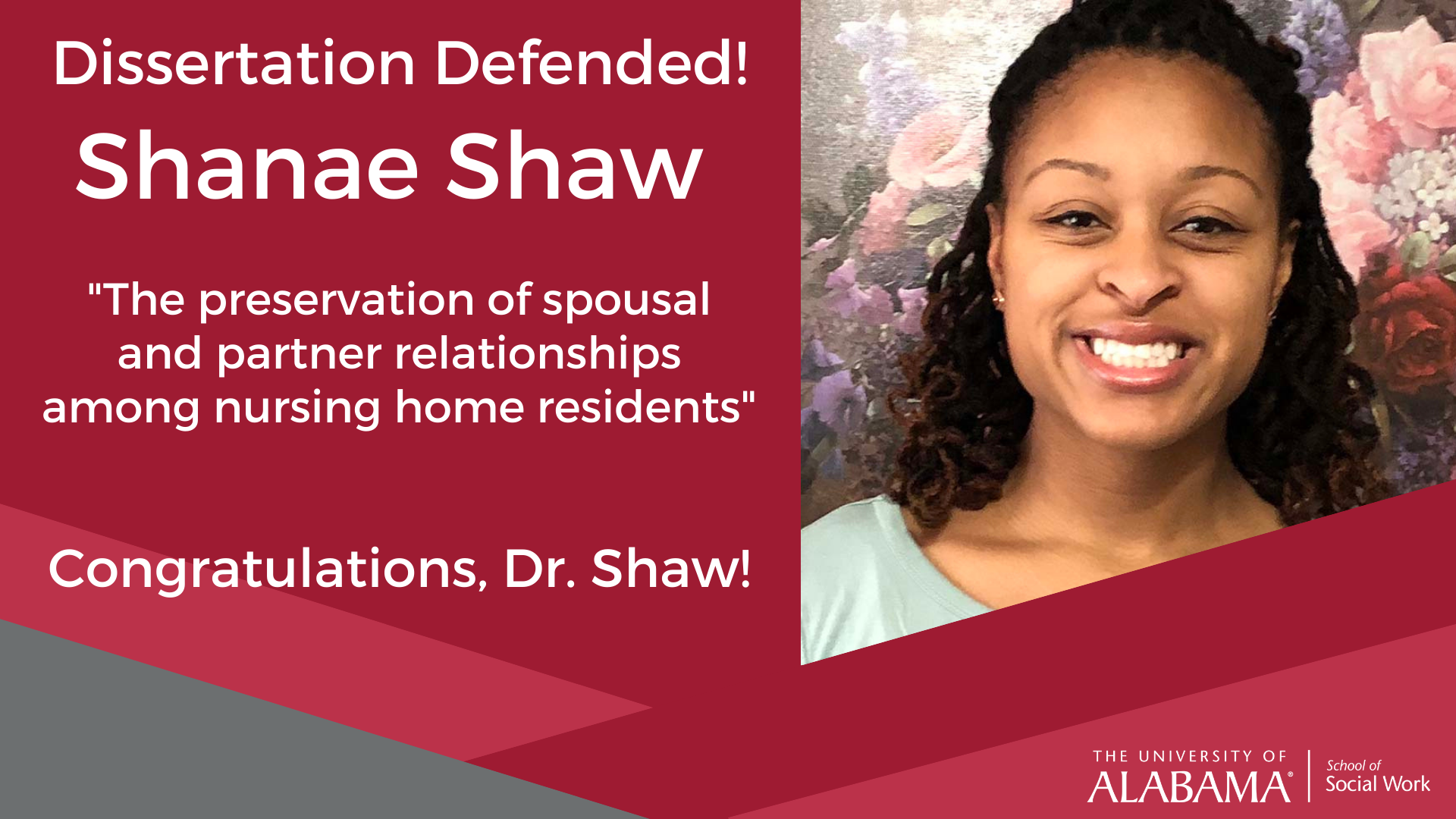Three-time SSW alumna studies nursing homes’ capacity to nurture spousal relationships
By David Miller
March 15, 2021
COVID-19 wasn’t supposed to play a factor in Dr. Shanae Shaw’s dissertation, but, like every other aspect of day-to-day life during the pandemic, she’s learned and adapted.
For Shaw, the COVID health protocols impacted the latter stages of her study, “The preservation of spousal and partner relationships among nursing home residents.” The pandemic also advanced her perspective on how and why nursing homes should nurture these relationships.
Prior to the pandemic, Shaw worked as a social worker at Mount Royal Towers, a nursing home in Birmingham, where she’d observed a unique relationship dynamic between a resident and spouse who lived in the community. She witnessed frequent visits by the spouse, sometimes three times a day, when the resident was initially admitted into the facility. The spouse would help their loved one with meals and provide company. However, as time progressed, visits eventually tapered off. Early in her doctoral work at UA, Shaw wondered what nursing home staff could have done to maintain and nurture that relationship, and what resources staff would have needed.
Nurses and social workers in care facilities are continually reminded of the social and emotional impact that in-person visits have for residents. But, when COVID-19 restrictions were set during the final year of Shaw’s dissertation work, these new protocols would reveal declining mental health and an exacerbation of dementia symptoms among residents. Shaw said her study participants noted an increase in prescriptions for anti-depressant medications for residents as well.
“As social workers, we always stress the importance of human relationships. However, when COVID hit, people were able to see the importance of these relationships first-hand, as many experienced difficulty maintaining their mental health in the absence of socialization” Shaw said. “It was eye opening to see this value we hold so highly, manifest right in front of me with this downward turn of nursing home residents because they can’t see their loved ones.”
Though the COVID-19 component wasn’t initially part of her dissertation proposal, the data gathered during the pandemic affirmed her belief that it is essential for nursing homes to use a collaborative approach to providing resources to support residents’ spousal relationships.
Motivation
Early in Shaw’s research, she found that the type of resident-spouse relationship she’d witnessed at Mount Royal Towers was less prevalent in other homes.
Mount Royal is a large facility, with different care sections – like independent and assisted living – under the same roof. However this “continuum of care” set up is not common place making it less likely that smaller nursing homes would encounter many instances of these types of relationships, she said.
“So, because it wasn’t as prevalent, I wondered if my research would fall on deaf ears,” Shaw said.
But, as she’d done throughout the years, she would draw encouragement from family.
Shaw’s social work spirit is rooted in her native Birmingham, where, at 5 years old, she first learned about homelessness when her grandmother took her to Kelly Ingram Park. From there, she and her grandmother would begin a Christmas tradition of bringing toiletry items to people at the park. Shaw would later volunteer for a homeless ministry through her church.
Shaw’s husband, Webster, a nursing home administrator, would be her latest source of motivation and an invaluable spark to her dissertation. He noted that the lack of prevalence of spousal relationships in nursing homes is actually ideal for facilities, as meeting the spousal/partner relationships needs of a small portion of resident, is feasible for many nursing homes without implementing major changes.
“[Webster] said that, ‘because it’s not prevalent doesn’t mean it’s not important,’” Shanae said. “Some nursing homes may have limited resources related to budget and staffing, so if they have one or two couples, they can commit to a plan to nurture those relationships.”
The plan
To implement a plan – with fidelity – to support spousal relationships in nursing homes, every aspect of care needs to be included, Shanae said.
She interviewed social workers in nursing homes who identified all of the components necessary to nurture these relationships. Those components included specific activities and outings that would be learned through surveys during admission. Participants also noted couples time outside of the building together, and Shanae’s plan outlines the necessary steps for notifying social services ahead of the outing, coordinating transportation, and getting approval from a medical director.
“The collaborative approach is vital for all of this to be coordinated,” Shanae said. “Every step needs to be outlined and followed.”
Collaboration is also critically important to overcome privacy concerns noted by participants, Shanae said.
“We kept hearing ‘residents must have privacy,’” Shanae said. “But when you’re sharing a room, or if a facility doesn’t have empty space for activities or visits, that’s difficult.”
Future in academia
Shanae is currently teaching social work courses at Alabama State University and is eager to begin navigating the job market.
Though she could have continued teaching without a PhD, earning a doctoral degree has been a goal for her since completing her BSW at UA, where she credits the support from all of the faculty and staff in Little Hall as their mentorship inspired her to pursue academia as a career path.
“I would look at my instructors and think, ‘I want to be like them,’” she said.
Earning a PhD also helps her compete in the job market, an aspect of navigating the workforce that’s top of mind, Shanae said.
“Ultimately, getting a PhD will help my daughters go further,” Shanae said. “And, being a double-minority, I wanted to see if I could do it. Even when I started the program, I dealt with a lot of ‘imposter syndrome.’ So, pushing myself, juggling being a wife and mother, and accomplishing this means a lot for me and my family.”
